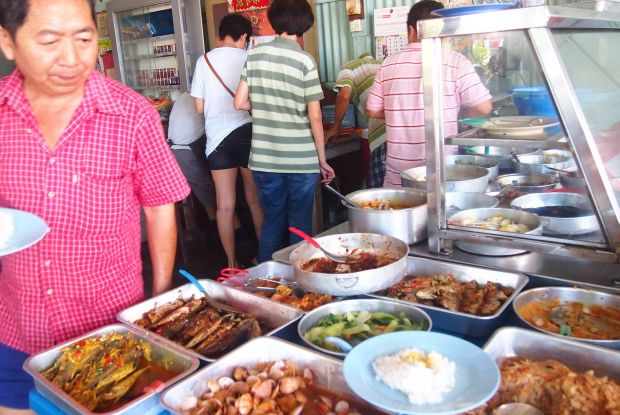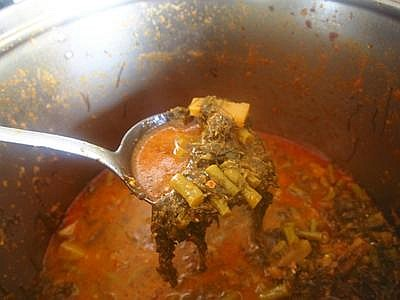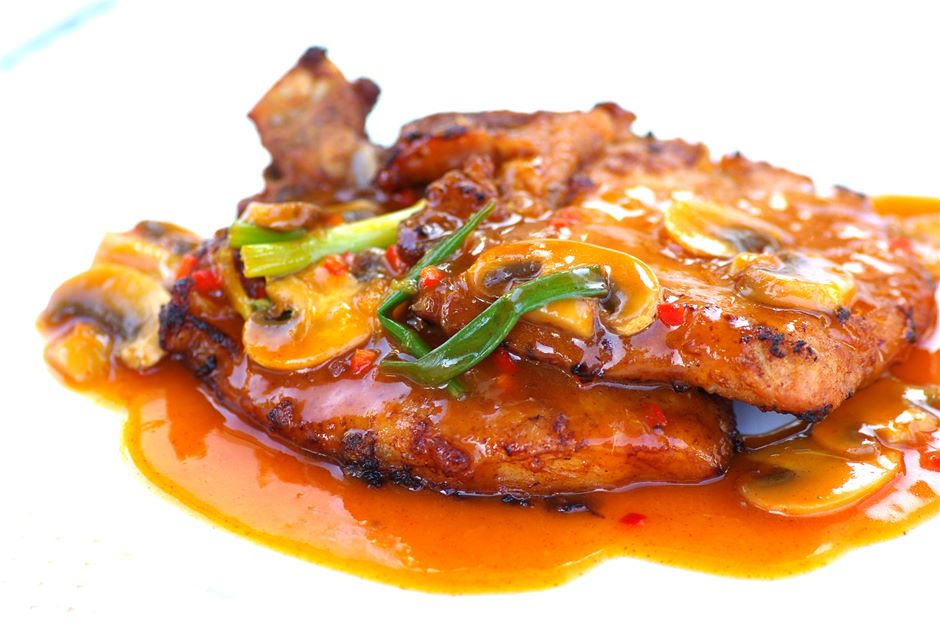Chuan Hong Coffee
is at Lot 576P,
Jalan Chan SweeTeong,
Penang.
Tel: 04-899 8345
Business hours: Mondays to Saturdays
from about 7.00am to 5.00pm.
Find an impressive array of economy rice dishes and more at Chuan Hong Coffee Shop.
THE mini-markets, shops and eateries which have sprung up by the traffic lights at Jalan Chan Swee Teong on Penang’s Tanjung Bungah Road (just outside Chee Sing Gardens) have, over the years, become a little enclave which services the local community here. Some of them have been there for decades.
In particular I’m talking about the Chuan Hong Coffee Shop situated right at the corner, which is now run by siblings Richard and Tony Ow, helped by their sister Ah Lan and their respective wives Ah Eng and Ah Far.
“My grandfather started the coffee shop in the early 1940s during the Second World War,” explained Richard, the oldest of the siblings. It passed on to his mother, and eventually down to them.
The original kopitiam used to be in a row of shops which faced the main Tanjung Bungah Road, but the shops were demolished to make way for a road leading to Chee Sing Gardens when it was built in the 1960s. They moved to their current premises in 1963. Although now retired, Mrs Ow Senior still goes to the café to pass the time of day, sitting in the back observing the goings-on with a gentle, bemused air.
“During her time, it was just a small coffee shop which offered a few food items. Since we took over, we’ve expanded the premises and also the menu,” Ah Eng said.
Ah Eng is the cook behind the popular Nonya kin jay p’nui (economy rice) stall which is now available there six days a week. She’s up at 4.30am, arriving at the café at a time when most people would still be cuddled up in bed to start off the dishes which require the longest cooking. Those of us (and I include myself) who have expensive, state-of-the-art kitchens filled with gadgets galore should take a lesson from her: considering the basic kitchen at the back with its primitive charcoal braziers, a couple of gas burners and relatively little other equipment, she manages to produce an impressive array of food.
“I prefer charcoal fires,” she explained, “as they have very distinct characteristics: the initial heat is hiong (fiery), but it soon dies down to a more gentle consistent temperature which allows the food to cook without burning or disintegrating.”
With help from her son Ah Boy, who is learning the ropes, their customers can now help themselves to over 40 different dishes every day. Richard helps to dispense the rice when the crowds start to appear especially around lunch time.
Once the pots are gently simmering away, Ah Eng heads off to the nearby Tanjung Bungah Market, where she buys all the fresh vegetables and produce she requires for the day, depending on the menu she’s decided on. It’s a tough life, but she’s used to it; even their one day off a week is spent stock checking and replenishing items.
Apart from home-style samp’hoi (dishes) like fried fish, Tu Khar Tow Cheow (trotters braised in fermented beans), different types of stir-fried vegetables and curries, a few nyonya favourites are always on offer every day, with specials laid on certain days of the week.
On Mondays, Wednesdays and Fridays, her rather appetising Kiam Hu Kut (salted fish bones) Curry with Vegetables – it’s orange and creamy, and a treat to eat with white rice – is available, and on Tuesdays and Fridays, it’s Perut Ikan, cooked the sour style without santan, redolent of green, musky daun kaduk (wild pepper plants leaves). There’s Wild Boar Curry, cooked with home-ground spices, on Tuesdays and Thursdays, although when this isn’t available it is substituted with ordinary pork.
Their economy rice stall is popular with local labourers and office workers, many of whom have neither the time, nor inclination, to start preparing the evening meal by the time they get home, so appreciate a bit of good, home-cooked food at very reasonable prices.
However, those who prefer something different are also catered for: stationed at the front, brother Tony and his wife Ah Far tend the fried noodles stall, ladles clanking against their large metal woks as they work in tandem, producing plate after plate of noodles and rice.
“My Fried Rice is popular, and Ah Far’s Dry Fried Bee Hoon is her speciality,” he told me.
And if that’s not enough, there’s Sultan’s Mee Rebus or Mee Goreng: he has been stationed at the stall in the coffee shop for the last 30 years, and is helped by wife Rina. He starts at about 2pm and carries on till about 7pm but is closed on Fridays.
Helen Ong loves to eat. Check out her blog on www.helenong.com.






